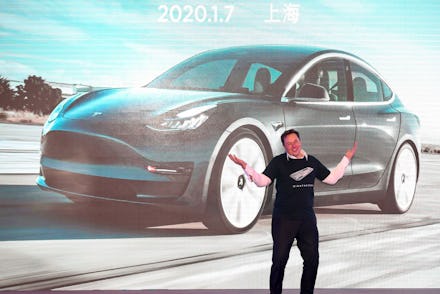Once again, Elon Musk says fully-autonomous Teslas are coming soon

Elon Musk said that autonomous Teslas are just around the corner. Again. In a pre-recorded video that played Thursday at the World AI Conference in Shanghai, the Tesla CEO claimed the company is "very close" to achieving level five autonomy, which means the cars wouldn't require any human intervention.
“I remain confident that we will have the basic functionality for level five autonomy complete this year,” Musk said in the video. “I think there are no fundamental challenges remaining for level five autonomy. There are many small problems, and then there’s the challenge of solving all those small problems and then putting the whole system together, and just keep addressing the long tail of problems.”
While Musk is expressing confidence in his company's path to autonomy, competitors have become increasingly skeptical of the technology. Waymo, the autonomous driving technology development company under the Google/Alphabet umbrella, recently said that it will be relying on human safety drivers "for the foreseeable future." General Motor's Cruise initially planned to introduce self-driving cars last year, but delayed deployment because more testing was required. The company hasn't provided any update as to when it expects fully autonomous vehicles will be road-ready.
Tempering expectations has never really been Musk's thing. He has been known to regularly preemptively hype developments, promising the world that the tech of the future is actually almost here, and it is his companies that will provide it. Sometimes those promises come to fruition and result in genuinely incredible technological breakthroughs, like rockets that land upright after launch. And then there are self-driving cars.
If Musk's latest claim that fully autonomous vehicles are coming soon sounds oddly familiar, that's because it is. Tesla's CEO has been touting the idea that the company's cars will drive themselves for nearly half a decade now. As far back as early 2016, Musk has been making claims that fully autonomous vehicles will be here sooner than we think. At first, he set his sights on the end of 2017, at which point he claimed Tesla vehicles would be able to make autonomous cross-country road trips. He restated that promise during a 2017 appearance at the TED Conference. That goal eventually shifted to simply demonstrating the car's capability to complete such a trip rather than unleashing the tech on all Teslas, but that benchmark was never met, either.
Despite those initial misses, Musk has continued to make bold proclamations about self-driving Teslas. In January 2017, he responded to a tweet asking for "full self-driving capability" in Teslas by saying it would arrive in "3 months maybe, 6 months definitely." It didn't. In June 2018, the CEO said in a tweet that the company would activate "full self-driving features" in Tesla vehicles with a software update planned for August. A spokesperson for the company quickly walked back the promise and said that Tesla would offer "limited" self-driving features rather than full autonomy, and Musk's promised delivery date once again came and went without actually delivering.
In 2019, Musk started this hype cycle again. In August, while appearing on the ARK Invest podcast, he claimed that Tesla will "feature-complete on full self-driving" technology by the end of the year, claiming that the company's vehicles will be able to "find you in a parking lot, pick you up, take you all the way to your destination without an intervention." The end of 2019 came and went without Tesla managing to deliver on this promise.
On the same podcast, Musk claimed that by the end of 2020, Tesla's self-driving features would be so reliable that drivers would be able to sleep in their car while the vehicle gets them to their destination. The end of 2020 has become the new placeholder date for Musk's self-driving dreams to be realized. On top of the promise of full autonomy, Musk has also claimed that the company would have as many as one million "robotaxis," or cars operating with no one in them, by the end of 2020. In that case, he at least warned that his prediction could be wrong, but claimed it would be for regulatory problems rather than a failure to deliver the technology.
It's worth noting that when Musk makes these promises, they are often public declarations that are celebrated by his fervent following and rewarded with an uptick in Tesla's stock price. It happened in 2018 when the company's stock got a 4.5 percent boost off a single tweet. It happened again on Thursday when the company got a bump of more than three percent off Musk's video declaration. But behind closed doors, the CEO might be a bit more tepid about his promises to shareholders. Despite hyping up a self-driving future in 2017, Musk told company shareholders that development was a "tough slog." In 2019, after making the promise of putting robotaxis on the road by 2020, he told investors, "Sometimes I am not on time."
Tesla very well may achieve "level five autonomy" by the end of the year. Tesla owners may be greeted with a sudden software update that gives their cars the ability to drive so well that they will never have to touch the steering wheel again. But if history proves correct, this is probably just another one of Musk's overly ambitious promises that’ destined to fall short.